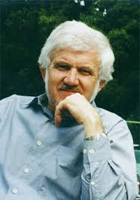The Recruit Poem by Geoffrey Donald Page
The Recruit
Every now and then you see him,
replayed on his slice of footage,
somewhere in the opening days —
short but solid, city hat,
five foot six at best,
cigarette between his fingers
flourishing a wisp of smoke.
He's glancing back towards the camera,
soundless in its shifting greys.
It's not long after six.
Brushed by two hours' worth of schooners,
and three sheets to the wind,
his mates have pushed on through the crowd,
drawn by something in the yeast
or women's whispers just now heard.
Six bob a day, the army says,
and ‘Christmas in Berlin'.
‘C'mon, mate!' he hears them calling,
Bluey, Jacko, Nobby, Fred.
He waves his cigarette at us;
then turns to join the dead.
Bombala
From the road you see it still,
vanishing in yellow grass,
the old Bombala line —
small embankments, minor cuttings,
low structures over creeks.
For thirty years these pale Merinos
have paid it no attention.
You stop the car, remembering
the signs they had at Central,
those wooden slats with destinations.
Bombala? Where was that exactly?
You contemplate the proud advances:
Cooma, 1889;
Nimmitabel in 1912
(in time for WWI recruits
laughing from receding windows):
Bombala, 1921.
You think too of the politicians
paunched and praising the Monaro,
those conscientious clerks all day
with maps and manifests,
the Chief Commissioner of Railways,
the calm men with theodolites
setting out directions,
the sweaty men with heavy arms
who tap the lines down tight. You see
the first train, rich with dignitaries
and self-congratulation,
the handshakes at the station,
the women standing back a bit
but welcoming the Future. You hear
the soot, the smoke, the hiss of steam,
the driver hooting at a crossing.
The rails are long-since pilfered but
an underlay of stones
and slump of timber bridges still
retain the sounds for those
who care to stop and listen.
It's been just thirty years.
The villages are mainly
growing sleepier.
The bitumen's a winner as
we should have always known.
The price of wool is less than half
of what it was in '53.
Obliging trucks are quick to haul
direct from yards to abattoir.
You stand there in a gap of silence
between successive cars.
You're looking for a word — say hubris —
but that is too dramatic for
these blonde and treeless landscapes,
these human traces, half-erased,
surfacing and sinking back
across a narrative of paddocks.
This poem has not been translated into any other language yet.
I would like to translate this poem